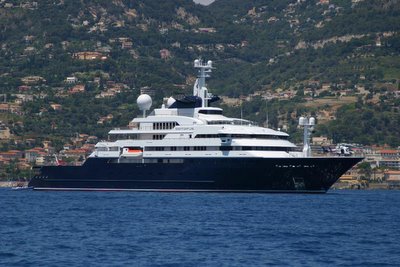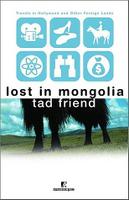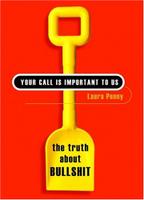20 December 2005
Driving 101
All right, class, listen up: In light of the epidemic of unbelievably bad driving all around us, we're going to review the basics of safe driving. First, PAY ATTENTION. That means, when you're driving: Don't talk on cellphones; don't eat muffins, sandwiches, roast beef, sushi, or anything else; don't drink coffee, beer, soft drinks, or vodka tonics; don't change music CDs; don't reload your handgun, shotgun, rifle, or AK-47; don't have sex of any kind; don't cut (or paint) your toenails; and, for heaven's sake, don't take a nap.
16 December 2005
This Stinks!
What's with all these scented ads jammed into magazines of all kinds? And not just magazines, either. I once got a bill from Nordstrom with a scented insert. I wrote them that if they did that again, I'd stop shopping at Nordstrom. They stopped sending scented inserts. But would such a direct approach work with, say, Vanity Fair?
Dear Graydon: I enjoy (mostly) your magazine, even though it's almost impossible to find the Table of Contents in the sea of full-page ads. But these disgusting scented ads have got to stop. I didn't ask for them, and I don't want them. If you keep inserting them in VF, I'll be forced to terminate my subscription.There must be some magazines out there that are still unscented--maybe this one.
14 November 2005
My Yacht's Bigger Than Yours
 Ever wonder how those billionaires spend their money? Sure you do. For some, boating's the thing. But these guys aren't interested in just any old 200-foot yacht. No indeed. Megabucks buy megayachts. Take Paul Allen, cofounder of Microsoft. He cruises the world's waters aboard Octopus (photo above), a 416-foot floating palace complete with two helipads, seven smaller boats of varying sizes, a 10-man submarine, and a crew of 60. Reputed to be the world's third-largest private yacht, Octopus cost about US $200 million to build. Not to be outdone, Larry Ellison, founder and chairman of Oracle, launched his own US $200 million entry in the megayacht sweepstakes, Rising Sun (photo below), a 452-foot vessel with 82 rooms spread over 5 stories and 86,000 square feet of living space. Comparing the Allen and Ellison yachts, CNN/Money's Steve Hargreaves called Octopus "the rugged Land Rover of the high seas," whereas Rising Sun is "more the plush Caddy."
Ever wonder how those billionaires spend their money? Sure you do. For some, boating's the thing. But these guys aren't interested in just any old 200-foot yacht. No indeed. Megabucks buy megayachts. Take Paul Allen, cofounder of Microsoft. He cruises the world's waters aboard Octopus (photo above), a 416-foot floating palace complete with two helipads, seven smaller boats of varying sizes, a 10-man submarine, and a crew of 60. Reputed to be the world's third-largest private yacht, Octopus cost about US $200 million to build. Not to be outdone, Larry Ellison, founder and chairman of Oracle, launched his own US $200 million entry in the megayacht sweepstakes, Rising Sun (photo below), a 452-foot vessel with 82 rooms spread over 5 stories and 86,000 square feet of living space. Comparing the Allen and Ellison yachts, CNN/Money's Steve Hargreaves called Octopus "the rugged Land Rover of the high seas," whereas Rising Sun is "more the plush Caddy."
27 October 2005
Free Speech
Col. Lawrence Wilkerson, chief of staff in the U.S. State Department from 2002 to 2005, gave a speech on October 19, 2005, in Washington, DC, at a program sponsored by the New America Foundation. His topic was the Bush administration's national security decision-making process. Excerpts of the speech have been widely quoted in the news media, especially Wilkerson's remarks about having seen a "cabal between the vice president of the United States, Richard Cheney, and the secretary of Defense, Donald Rumsfeld, on critical issues that made decisions that the bureaucracy did not know were being made." During his talk, Wilkerson encouraged the audience to read The Assassins' Gate, by George Packer, which Salon's Gary Kamiya called "the best book yet about the Iraq war." You can find Col. Wilkerson's speech in its entirety right here.
20 October 2005
Turn Style
Have you noticed that no one uses turn signals anymore? It's true. I do a lot of informal surveys when I'm driving--checking the next 10 cars that turn, say--and I have found that most drivers don't signal their turns. Soon new car models won't come with turn signals; they're obsolete. Talking this development over recently with a friend, I wondered why it was happening. He pointed out that using turn signals gives information to the enemy--i.e., other drivers. He may be on to something. People are driving a lot more aggressively these days--especially SUV drivers, who apparently think they're invincible inside those grotesquely oversized gas-guzzlers. Another road hazard, one that's gaining traction by the day, is spontaneous U-turns. These occur when someone misses his turn and is too impatient to drive to the next intersection and find a safe way to turn around. Instead, he abruptly executes a midblock U-turn right in front of you, endangering every other vehicle in the vicinity. But what does he care? He's the only driver on the road, so he can do anything he wants.
23 September 2005
Colossal Failure
Browsing the Harper's magazine Web site, I came across a compelling essay titled "The Uses of Disaster," written by Rebecca Solnit and posted September 9. In her closing paragraphs, Solnit turns to the catastrophic horrors in New Orleans triggered by Hurricane Katrina:
The most hellish image in New Orleans was not the battering waves of Lake Pontchartrain or even the homeless children wandering on raised highways. It was the forgotten thousands crammed into the fetid depths of the Superdome. And what most news outlets failed to report was that those infernos were not designed by the people within, nor did they represent the spontaneous eruption of nature red in tooth and claw. They were created by the authorities. The people within were not allowed to leave. The Convention Center and the Superdome became open prisons. "They won't let them walk out," reported Fox News anchor Shepard Smith, in a radical departure from the script. "They got locked in there. And anyone who walks up out of that city now is turned around. You are not allowed to go to Gretna, Louisiana, from New Orleans, Louisiana. Over there, there's hope. Over there, there's electricity. Over there, there is food and water. But you cannot go from here to there. The government will not allow you to do it. It's a fact." Jesse Jackson compared the Superdome to the hull of a slave ship.
This is the disaster our society has been working to realize for a quarter century, ever since Ronald Reagan rode into town on promises of massive tax cuts. Many of the stories we hear about sudden natural disasters are about the brutally selfish human nature of the survivors, predicated on the notion that survival is, like the marketplace, a matter of competition, not cooperation. And when we look back at Katrina, we may see that the greatest savagery was that of our public officials, who not only failed to provide the infrastructure, social services, and opportunities that would have significantly decreased the vulnerability of pre-hurricane New Orleans, but who also, when disaster did occur, put their ideology before their people.
31 August 2005
Business Is Booming

According to an article in the August 30, 2005, New York Times, worldwide weapons sales in 2004 reached nearly $37 billion, their highest level since 2000. A major factor in this impressive performance was the $9.6 billion in arms delivered to Near East and Asian countries last year by the United States, the world's largest supplier of weapons to developing nations. The Times cited a just-released Congressional Research Service report as its source for these figures. The weapons being sold include tanks, combat aircraft, missiles, and submarines. It's reassuring to learn that Uncle Sam continues to dominate such an important and constructive segment of the global economy.
15 August 2005
The Joke's on Us
 Some years ago, Tad Friend wrote a brilliant, hilarious, and infuriating piece for the New Yorker about Aaron Sorkin's heroic efforts to talk ABC out of imposing a laugh track on his then-new TV show Sports Night. Sorkin, God bless him, was persistent and finally won a partial victory. Partial because ABC agreed to withhold some, but not all, "sweeteners," as laugh tracks are called in the industry, from the show. Still, it was an important victory for the talent over the suits, and it earned Sorkin a spot on my Inspirational Americans list a year before he started West Wing. You see, laugh tracks enrage me so much I never watch a TV show that has them. The Seinfeld phenomenon passed me by because the show was laugh-track polluted. Why get so worked up about this? you may wonder. Well, for openers, I don't like to be insulted, and I doubt you do, either. Network executives quoted in Friend's article insisted that people watching television wouldn't know when to laugh without the laugh track. Is that so? Well, I find it pretty easy to laugh when something strikes me as funny, and I can actually break out laughing without prompts of any kind, surprising as that may be to the arrogant morons who control TV sitcoms. Think of it--these clowns think viewers are so fucking stupid that we wouldn't know to laugh unless they told us when we should. Toward the end of the New Yorker article, Friend unveiled a great quote from Sorkin, who said that adding a laugh track to Sports Night "feels like I've put on an Armani tuxedo, tied my tie, snapped on my cuff links, and the last thing I do before I leave the house is spray Cheez Whiz all over myself." Now, that's funny. HAHAHAHAHAHAHA.
Some years ago, Tad Friend wrote a brilliant, hilarious, and infuriating piece for the New Yorker about Aaron Sorkin's heroic efforts to talk ABC out of imposing a laugh track on his then-new TV show Sports Night. Sorkin, God bless him, was persistent and finally won a partial victory. Partial because ABC agreed to withhold some, but not all, "sweeteners," as laugh tracks are called in the industry, from the show. Still, it was an important victory for the talent over the suits, and it earned Sorkin a spot on my Inspirational Americans list a year before he started West Wing. You see, laugh tracks enrage me so much I never watch a TV show that has them. The Seinfeld phenomenon passed me by because the show was laugh-track polluted. Why get so worked up about this? you may wonder. Well, for openers, I don't like to be insulted, and I doubt you do, either. Network executives quoted in Friend's article insisted that people watching television wouldn't know when to laugh without the laugh track. Is that so? Well, I find it pretty easy to laugh when something strikes me as funny, and I can actually break out laughing without prompts of any kind, surprising as that may be to the arrogant morons who control TV sitcoms. Think of it--these clowns think viewers are so fucking stupid that we wouldn't know to laugh unless they told us when we should. Toward the end of the New Yorker article, Friend unveiled a great quote from Sorkin, who said that adding a laugh track to Sports Night "feels like I've put on an Armani tuxedo, tied my tie, snapped on my cuff links, and the last thing I do before I leave the house is spray Cheez Whiz all over myself." Now, that's funny. HAHAHAHAHAHAHA.
01 August 2005
On the Job
 McSweeney's Web site has a fascinating collection of interviews with people who work at "unusual" jobs. Activities director at a retirement home, repo man, certified firewalk instructor, New York City limo driver, and magician's assistant are a few examples. Because the interviewees are not professional writers, candor triumphs over craft. Their answers are often close to the bone and can be quite moving. There's also very funny material here, some of it surely unintended. Here's an excerpt from "On the Night Shift," an interview with a janitor:
McSweeney's Web site has a fascinating collection of interviews with people who work at "unusual" jobs. Activities director at a retirement home, repo man, certified firewalk instructor, New York City limo driver, and magician's assistant are a few examples. Because the interviewees are not professional writers, candor triumphs over craft. Their answers are often close to the bone and can be quite moving. There's also very funny material here, some of it surely unintended. Here's an excerpt from "On the Night Shift," an interview with a janitor:The first vacuum I worked with, I called it Maud. She was a good vacuum. You know, life is like vacuuming — you're going along and everything is fine, when suddenly it shuts off and you realize you've run out of cord.And this is from an interview with a guy who worked at a hot dog restaurant:
Q: What was the name of the place?
A: It was called Yum Yum Better Ice Cream and Hot Dogs.
Q: Was it some kind of hot-dog stand?
A: No, it was a family-run restaurant, run by two brothers who didn't speak to each other. They took turns managing—never at the same time, though.
Q: Did you have to wear a uniform?
A: You had to wear a Yum Yum baseball cap or a paper cap. Also a Yum Yum T-shirt that was just filthy. The people who worked there were not the most ambitious or cleanest people. I remember fighting for the good aprons. The ones that weren't torn or dirty or had strings that were too short.
21 July 2005
The Old Man and the Tree

I am standing in a park a few miles from Tofino, British Columbia, on Vancouver Island's Pacific coast. Katie and I went to this stunningly beautiful part of the world to celebrate my 60th birthday, and I can't deny that I was feeling the weight of six decades. But the great tree I'm leaning against reminds me that there are creatures on the earth far older than I am or ever will be.
11 July 2005
What Do You Mean?
 In this marketing-saturated era, we're bombarded with expressions that actually mean the opposite of what they say. Nowhere is this hypocrisy more prevalent than in the responses we get from "Customer Service" departments, sometimes laughably called "Customer Care." For example, the recorded telephone message insisting that "Your call is important to us" clearly means "We don't care what you think, so why don't you stop bothering us." (If our call really was important to them, they wouldn't park us on interminable hold, hoping we'll get discouraged and hang up.) My theory is that the downgrading of customers began when the financial media started referring to them as "consumers." This institutional term--as in Consumer Price Index--replaced the more personal word "customer," with its suggestion of a living, breathing person who goes to the store to buy something and often knows the store owner. Now, our value has been reduced to that of spending units, whose purchases will be tallied electronically and published (or posted) in charts, tables, and graphs to help marketers sell us more crap we don't need.
In this marketing-saturated era, we're bombarded with expressions that actually mean the opposite of what they say. Nowhere is this hypocrisy more prevalent than in the responses we get from "Customer Service" departments, sometimes laughably called "Customer Care." For example, the recorded telephone message insisting that "Your call is important to us" clearly means "We don't care what you think, so why don't you stop bothering us." (If our call really was important to them, they wouldn't park us on interminable hold, hoping we'll get discouraged and hang up.) My theory is that the downgrading of customers began when the financial media started referring to them as "consumers." This institutional term--as in Consumer Price Index--replaced the more personal word "customer," with its suggestion of a living, breathing person who goes to the store to buy something and often knows the store owner. Now, our value has been reduced to that of spending units, whose purchases will be tallied electronically and published (or posted) in charts, tables, and graphs to help marketers sell us more crap we don't need.
05 July 2005
Aid and Comfort

A while back, a story made the news about three lions coming to the rescue of a 12-year-old Ethiopian girl, who had been kidnapped by a group of men who wanted to force her into marriage. The lions chased off her abductors and guarded the girl for half a day, until police and her family arrived to take her home. At that point, the lions ended their protective custody and departed. I see no reason not to believe this story. Animals, unlike humans, are not distracted by incessant mental chatter. The lions sensed a helpless creature in trouble and came to her rescue. The next time you're tempted to think of humans as superior to "lesser" animals, ask yourself how you would have responded in this situation.
30 June 2005
Drowning in BS
Harry G. Frankfurt, a professor emeritus of philosophy at Princeton University, has written a 67-page book, titled On Bullshit, that has become a New York Times best-seller. Of course, The Times won't publish the actual title, presumably judging it "unfit to print." So we find instead On Bull---- riding the paper's best-seller lists for 26 weeks now. Some interviewer should ask the author whether the Times's prim evisceration of his book's title qualifies as BS. In any case, you can hear Prof. Frankfurt discuss his book by clicking on this.
Subscribe to:
Posts (Atom)